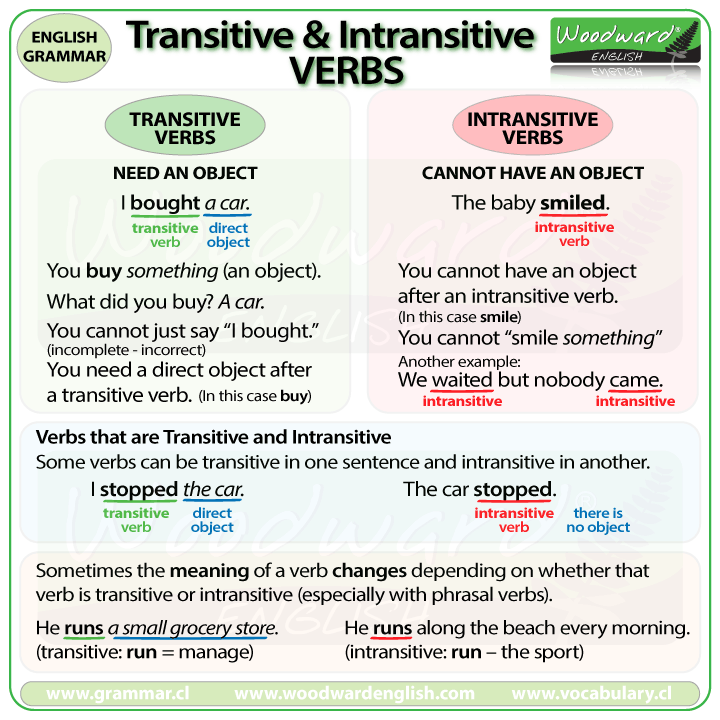Verbs in English can be divided into two groups:
Transitive verbs and Intransitive verbs.
TRANSITIVE VERBS
Transitive verbs require an object to complete their meaning.
Imagine that I say:
- I bought.
This sentence is incomplete. There is information that is missing.
You are probably wondering what I bought. (What did you buy Rob?)
Why is this sentence incomplete?
Because BOUGHT (the past of buy) is a transitive verb and a transitive verb needs an object after it to complete the sentence. The object after a transitive verb can be a noun or a pronoun.
- I bought a car.
Now the sentence is complete and we can understand it. We added the object “a car” after the verb.
Let’s look at some other examples.
If someone says:
- She likes. (incomplete - incorrect)
You probably think … She likes WHAT? (What does she like?)
Like is a transitive verb so we need an object after the verb.
- She likes chocolate.
Now we know what she likes so this sentence is complete and correct.
- I invited Angelica.
You cannot just say I invited because the sentence is incomplete. The person who is listening would probably ask “Whom did you invite?” So we need an object (in this case a person) after the transitive verb invite.
- I cut my finger.
You cannot just say I cut because the sentence is incomplete. The person who is listening would probably ask “Cut what?”
Cut is a transitive verb because you need to cut something (an object, a thing).
- The man stole a bike.
We need to say WHAT the man stole in order to understand the sentence/situation. Steal (stole is the past tense of steal) is a transitive verb. The object in this sentence is the bike.
So we have seen that transitive verbs need an object after them.
This object receives the action of the verb.
Transitive verbs always ask “what?” or “whom?”
- What did you buy? – I bought a car.
- What did you cut? – I cut my finger.
- Whom did she invite? – I invited Angelica.
Subject + transitive verb + object
The same rules apply to phrasal verbs.
If someone says: “I’m looking for”
You would automatically think “Looking for what? Looking for whom?”
We need to add an object to make the sentence complete.
- I am looking for my passport.
My passport is the object (that you are looking for)
More about transitive phrasal verbs here: Transitive and Intransitive Phrasal Verbs
Transitive Verbs – Passive Form
Transitive verbs can have a passive form.
Active: Subject + transitive verb + object
Passive: Object + was/were + transitive verb (+ by subject)
- Thieves stole his car. (active)
- His car was stolen. (passive)
- Thomas Edison invented the light bulb. (active)
- The light bulb was invented by Thomas Edison. (passive)
- They sold some books. (active)
- Some books were sold. (passive)
Learn more about the passive voice.
Example sentences using TRANSITIVE verbs
- We enjoyed the concert.
- I opened the door.
- She kicked the ball.
- He took me to a restaurant.
- I saw an accident.
- He copied my answer.
INTRANSITIVE VERBS
Intransitive verbs cannot have a direct object after them.
The subject is doing the action of the verb and nothing receives the action. An intransitive verb does not pass the action to an object.
- He arrived.
Here we cannot have an object after the intransitive verb arrive.
You cannot “arrive something” (incorrect).
An intransitive verb expresses an action that is complete in itself and it doesn’t need an object to receive the action.
- The baby smiled.
Here we cannot have an object after the intransitive verb smiled.
You cannot “smile something” (incorrect).
- The apple fell from the tree.
You cannot “fall something” so the verb is intransitive.
“From the tree” is not an object, it is an adverbial phrase ( = it acts like an adverb and tells us where it happened).
The same rules apply to intransitive phrasal verbs. You cannot have an object after an intransitive phrasal verb.
- I get up at 6 every morning.
Example sentences using INTRANSITIVE verbs
- We arrived around midday.
- She sneezed loudly.
- Your baby cries a lot.
- His grandfather died last year.
- The rain fell heavily.
- I was waiting but nothing happened.
- The jokes were not funny and nobody laughed.
- I walk to work every day.
- We sat on the bench.
- He stood in the corner.
- We waited but nobody came.
Verbs that are Transitive and Intransitive
Many verbs can be both transitive and intransitive.
They can be transitive in one sentence and intransitive in another sentence.
(These are called ambitransitive verbs)
- You have grown since I last saw you. (intransitive)
- You have grown a beard since I last saw you. (transitive)
Sometimes the meaning changes depending on whether the verb is transitive or intransitive
- He runs along the beach every morning (intransitive: run – the action/sport)
- He runs a small grocery store (transitive: run = manage)
- The plane will take off in five minutes. (intransitive: take off = to leave the ground and begin to fly)
- Please take off your shoes before entering the house. (transitive: take off = to remove something)
Example sentences of verbs that are both transitive and intransitive
(transitive) - (intransitive)
I stopped the car. – The car stopped.
I broke my coffee mug. – My coffee mug broke.
The summer heat melted my ice cream. – My ice cream melted.
She speaks Arabic. – She speaks very quickly.
Mike is reading a book. – Mike is reading.
New Zealand won the match. – New Zealand won.
A good dictionary will tell you whether a verb is transitive (usually vt. or tr. next to the verb in dictionaries) or intransitive (vi. or intr.)









0 Comments